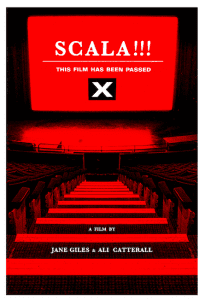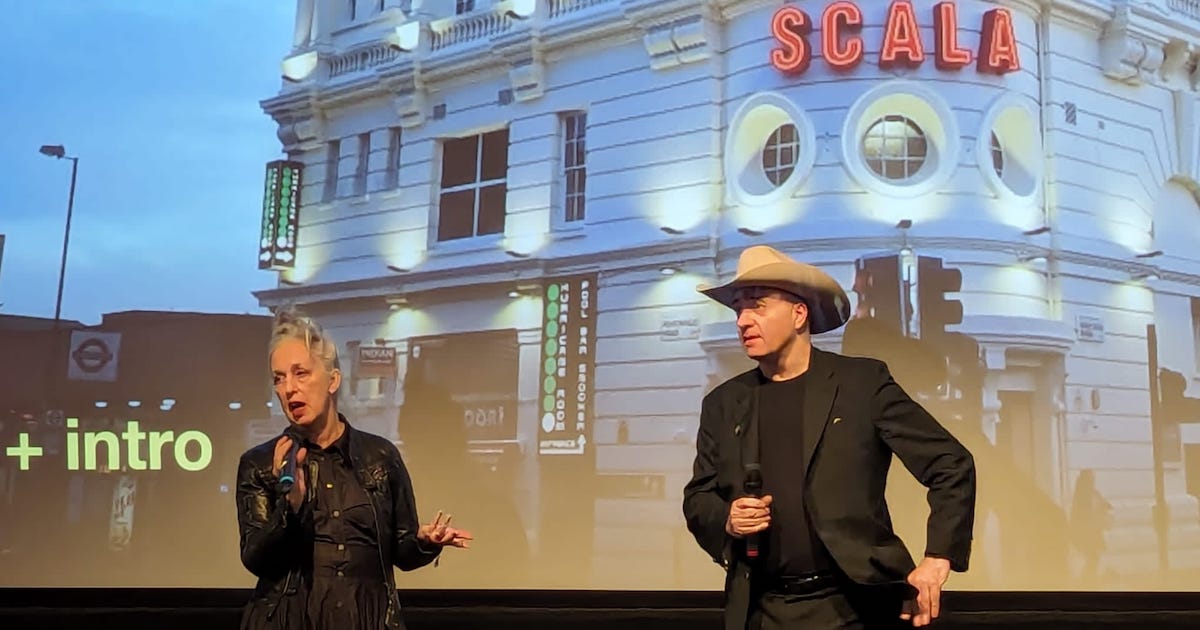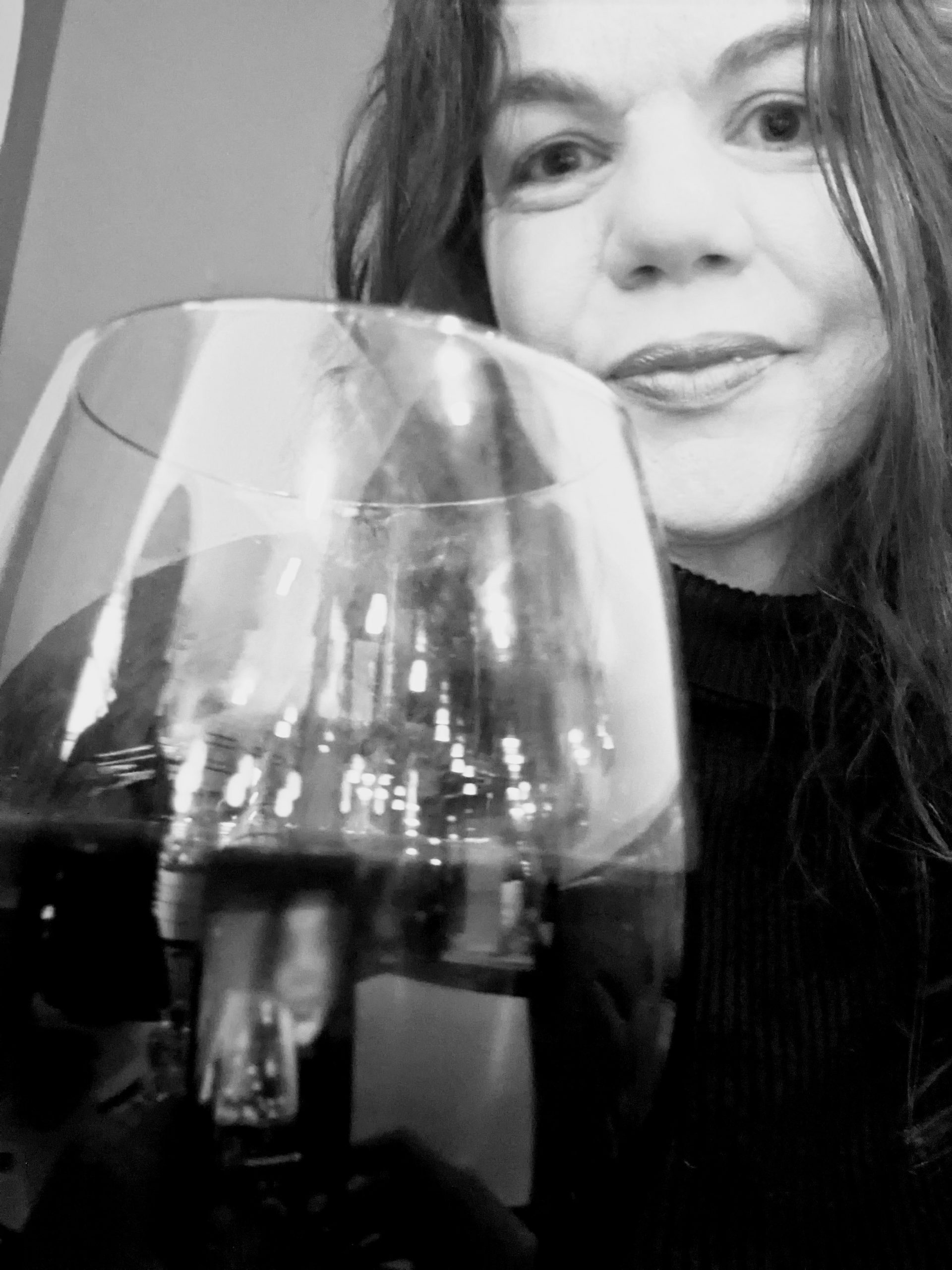Scala!!! A nostalgia trip, even if you weren’t there
The new documentary about the notorious Scala cinema in London’s Kings Cross is a trip down memory lane for those who were part of the scene. And, if you weren’t there, you still might find yourself reminiscing about a bygone era.
The Scala started life on London’s Tottenham Road as a cinema club in 1978. Before later moving on to grander premises in Kings Cross in 1981 under the management of Stephen Woolley. In an era when multiplexes were starting to expand and ultimately snuff out many smaller cinemas, the Scala was a weird and wonderful anomaly. Until the wild ride came to an end in 1993.
Those who were part of the Scala during its heyday, complete with terrifying toilets, resident cats, sex scenes on and off screen and the occasional death, will no doubt enjoy Scala!!!
By operating as a members-only club, the Scala was able to get away with screening an astounding range of films that you probably weren’t going to experience at the local Odeon. Debuting (and closing) with the original 1933 King Kong, from 1978 until 1993, the Scala was a hard-seated, graffitied, tube train-rattled haven for the likes of Salo: The Last Days of Sodom, anything made by John Waters, (sometimes literally) eye-popping horror and films you probably wouldn’t watch with anyone of a nervous or prudish disposition.
 Directed by Jane Giles and Ali Catterall, Scala!!! chronicles 15 years of a cinema that was as much about the “weirdos and misfits” who frequented it and the challengingly magnificent building as it was about the films.
Directed by Jane Giles and Ali Catterall, Scala!!! chronicles 15 years of a cinema that was as much about the “weirdos and misfits” who frequented it and the challengingly magnificent building as it was about the films.
Known for all-night screenings of back-to-back movies, it was not just a place for film fans to indulge themselves. It was a safe space for the LGBTQ+ community in an era of oppression thanks to Section 28 and the stigma of the AIDS tragedy.
A place of warmth on cold, brutal nights in pre-gentrified Kings Cross. And an alternative to expensive London hotel rooms for bands from out of town, such as The Jesus and Mary Chain.
Those who were part of the Scala during its heyday, complete with terrifying toilets, resident cats, sex scenes on and off screen and the occasional death, will no doubt enjoy Scala!!! for the genuinely heartwarming, riotous romp down memory lane that it is. For those who were not part of that scene, usually for reasons of age or distance, there is still so much to love about this film.
The Scala’s politics and activism is an important part of the documentary
For me, the last days of the Scala coincided with my early 20s, which were spent in Sydney. So I’ll never know if I would have hallucinated my way through an all-nighter or thrilled to the spectacle of Divine eating dog poo in Pink Flamingos. But as someone who spent a lot of time in the UK as a child and, with a history teacher father in a house where the news always seemed to be on, I was acutely aware of Thatcherism and have fond childhood memories of catching the tube with punks in the ‘80s, which made Scala!!! resonate with me as a catalyst for my own memories.
The Scala’s politics and activism is an important part of the documentary and a timely reminder of how awful things were for the LGBTQ+ community then – and how, despite changes such as marriage equality, discrimination has not been eliminated. The recollections of Vic Roberts, a proudly queer usher at the Scala, and Jim MacSweeney, manager of Gay’s The Word bookshop, are profoundly moving.
When Roberts talks about how the Scala allowed everyone to be whoever they are and MacSweeney recalls the cinema holding a benefit for his bookshop after a ridiculous police raid threatened its future, the documentary instantly becomes part of the wider narrative of London’s LGBTQ+ history.
Watching Scala!!! made me wish I had moved permanently to London a bit sooner than 2011. But equally it was a joy and an honour to hear the stories of the people who made the cinema the unique place it so clearly was.
Paul Burston, author and participant in the documentary, told me the Scala was “many things – a cinema, a party venue, a community hub and what we’d now call a safe space.” Recalling his experiences as a young, gay man, he says the 1980s were “a hostile time for minority groups and the Scala provided refuge.”
He says the cinema’s lasting legacy was the strong sense of community it created. “All sorts of outsiders felt equally at home there – it was intersectional before it became fashionable.”

Directors Jane Giles and Ali Caterall at the screening
The Scala cinema club closed its doors amid financial pressures exacerbated by a court case involving the screening of Stanley Kubrick’s A Clockwork Orange. It was a heartbreaking time for the community it created in a part of London that was seedy and often dangerous… but not without its dark charms.
For anyone who wants to try and experience a taste of what it was like to be a Scala cinema club member, Burston recommends a small cinema in Hastings called The Electric Palace where “the programming is eclectic and the seats are uncomfortable.”
“I attended a friend’s 50th birthday party there with a screening of Priscilla, Queen of the Desert. Several guests said it felt like being back at the Scala, albeit on a smaller scale,” says Burston.
In the meantime, check out Scala!!! for yourself. It is being released at cinemas across the country. And, on 22 January, it will be released on Blu-Ray and available on the BFI Player.

In a career that has spanned Australia, the Middle East and the UK, Georgia has written about all sorts of things, including sex, cars, food, oil and gas, insurance, fashion, travel, workplace safety, health, religious affairs, glass and glazing… When she’s not writing words for fun and profit, she can usually be found with a glass of something French and red in her hand.



Leave a comment